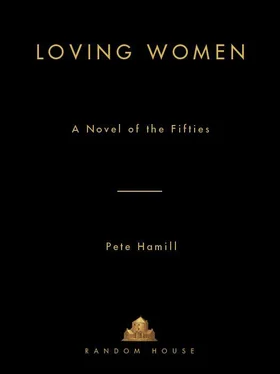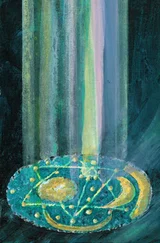“It’s too simple, too easy,” he said. “Those goddamned trees are stolen right out of Snow White .”
“What’ll you do with it?”
“Burn it,” he said. “Or give it to Red Cannon. He’ll think it’s his mother and love it to death.”
I told him I’d bought a newsprint pad and the chalks, and he said newsprint was all right for sketching, but the paper was so frail you couldn’t work it, couldn’t erase or manipulate the chalk very much. “You’ve got to be right the first time,” he said, “and almost nobody is.” We went into the mess hall and sat down with slabs of gray pot roast. “You see, you couldn’t draw this piece of dead animal,” Miles said. “You have to paint it. To get the revolting dead color exactly right. If a man had this color, you’d rush him to the hospital.”
I laughed and he ate slowly, cutting the pieces small, and chewing with the front of his mouth. “Fuel,” he murmured, “just think of it as fuel.”
There were some books about art that I should read, and he could loan them to me, he said. But if I were serious , I had to draw every day. It didn’t matter how many books I read or how many pictures I saw in museums. You learned to draw by drawing. Scribble drawings, doodle them, go off and make pictures. And look at everything. “You’d better feel something about what you see, too,” he said. “If you don’t feel anything about your drawings, they’ll be as dead as this disgusting pot roast.”
After a while, I said: “Could you show me how to make paintings?”
“Sure,” Miles said, as I felt myself swelling with new ideas, images, ambitions, and the sense that I’d made a friend and met a master. “If you don’t try to teach me about that fucking baseball.”
What Miles Told Me
I became an artist to keep from going crazy. It was as simple as that. My father killed himself in 1930, leaving my mother to take care of me. I was fourteen months old. We lived in Marietta, Georgia, a boring little suburb just outside of Atlanta, and my father was in the furniture business. I don’t remember anything about him. The son of a bitch. After he killed himself, Mother hid all the photographs of him, all his letters, the documents that made up his shitty little life. She put them away in an old steamer trunk that she’d never taken anywhere (poor Mother) and I didn’t see them until I was what is laughingly called Grown Up. By then, I could have been looking at pictures of George Washington .
Mother did her best. I give her that. This was the Depression, and it was hard on everyone, I suppose, but even harder in the South. The furniture company was gone before Father died; that’s why he died (or so Mother said, telling me about him later, in bits and pieces, and stopping always at the part where she found him in the chair with his thumb in the trigger guard of the shotgun and his face blown off, stopping there until the last time she started the story and then, saying it, telling me, she was rid of it and never told about it again). His relatives stayed away from Mother, afraid, I suppose, that they’d remind her of him, or she would ask for money, or maybe they blamed her in some way, the miserable shits. I just don’t know why they stayed away and I don’t give a goddamn. The fact is they treated us like lepers. I wish them painful deaths. There’s a blur there somewhere. Even now. Mother and I lived in a house where some things were never said .
But we had that house, bought and paid for when Father was alive. He left her that, paid for when he and the country were riding high. A great gabled house, with porticoes and parquet floors and a piano in the living room and bad pictures hanging everywhere. I always had my own room, and after I started drawing (I was seven and the pictures always showed me with a father and mother, O Sigmund Freud, please do not puke!). Mother outfitted one of the other rooms as a little studio. I had my own table and lots of paper and crayons and watercolors. I would sit up there and draw and listen to Mother downstairs, giving her goddamned piano lessons. When she played, the music was nice. When the others played, I hated it; they couldn’t do it right; they were flat or off-key, and this made me draw in the same way, losing whatever it was that I had .
Mother did more than give piano lessons. She had to, to survive, to feed us both, to heat the house, to keep from losing it to the tax collectors. So she took in sewing too, although I don’t know where she went to get it. She certainly didn’t pick it up in the neighborhood. Not Mother. She was too proud for that. Right through the Depression, she still had a colored woman come in once a week to clean. A thin bony woman named Mahalia, who would come to the house when Mother was out and play the colored stations on the radio and dance around. Thin as she was, she had the eyes of a fat woman. Just scared hell out of me. Maybe outside every thin woman there’s a fat one trying to get in. Those damned eyes were greedy, defiant, alarming. You couldn’t make our Mahalia do anything she didn’t want to do and once when I used the word nigger to describe someone else, she slapped my face. Good and hard. I cried and cried, not knowing what I’d done, and then knowing, slowly, when our Mahalia said that she was a woman, a person, colored, but not some damned nigger. I was about ten then, and I didn’t tell my mother ’cause I knew Mahalia was right. I didn’t want Mother taking my side .
Mother kept saying the Depression would be over soon, and then we’d be all right again, but I still don’t know what she meant. It didn’t matter. The Depression never ended, and all she talked about was how hopeless it was, and how even Franklin Roosevelt and the New Deal couldn’t end it. Finally, when I was oh, twelve, she took a job in a restaurant. With a pink uniform. Five nights a week. I knew she thought this was a comedown, but she never talked about it; it was as if the humiliation wouldn’t be real if she didn’t mention it. She supported us with the waitress job and the sewing and the piano lessons, although as the Depression went on and on, fewer and fewer little bastards came over to assault the piano. That was good news to me, but terrible for Mother. She even thought it was an aesthetic judgment of some goddamned kind .
She took that waitress job because of me. She was convinced that I had talent, thought I was the greatest artist since Leonardo, or at least since Norman Rockwell. She saved all my drawings and made me date them and framed some of them. She bought me supplies. Nothing was too good for her darling little Miles. And then she enrolled me at the Art Institute in Atlanta, in the kiddie class every Saturday morning. She had to come up with bus money and charcoal and paint money and lunch money. That’s why she started waiting on tables, just telling them at the restaurant (which I never saw, another mystery to be imagined and not touched, smelled, felt or seen) that she could work any day except Saturday .
All through this time, I started to feel odd. Out of it. Weird. You know how I feel about baseball. Well, even then, a kid, I didn’t care for the game, never learned it, never played it with the other kids. I don’t know why. Maybe it was timing. The summer I got scarlet fever, I had to stay home while the other boys were learning and by the time I could go out to the street again, I was already behind. Also, I felt strange, ugly even, with this damned big head, and I couldn’t throw right or something … So I decided I didn’t like the game. But I knew I was ahead in at least one goddamned thing and that was drawing. I had that, and the others didn’t. So when football season came around, I felt the same way as I did about baseball. The same for swimming, too. Mother kept telling me that all the public swimming pools were just filthy breeding grounds for polio, and in some ways she was right. And she warned me that if I played football, I could break my drawing hand, my arm, my shoulder. I wouldn’t be able to do this … thing, this magic thing. This thing of putting marks on paper that made human beings and places and light come to life. She was afraid for me and I was afraid of her being afraid so I never learned any sport. I don’t know how they’re played or how I’m supposed to watch them. Maybe you’re right. Maybe that’s very sad. But I don’t care. I don’t miss sports at all. They’re of no interest to me .
Читать дальше












